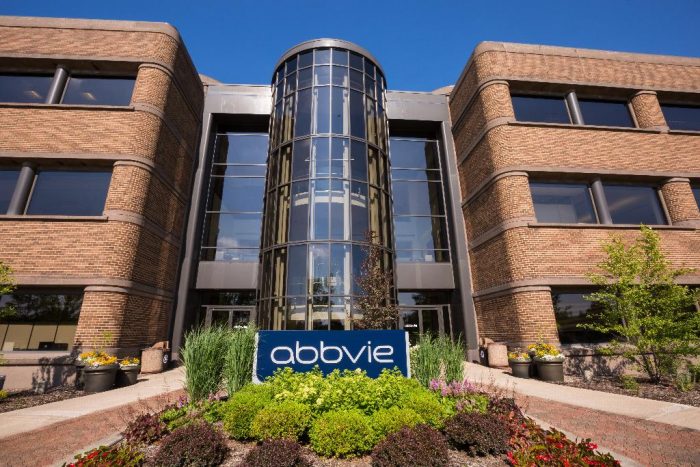
AbbVie is expanding its reach in immunology by acquiring a U.K.-based biotech company that brings a drug candidate for a rare and fatal lung disorder as well as a platform technology that can generate novel antibodies with the potential to hit elusive protein targets.
The North Chicago-based pharmaceutical giant said Thursday it paid $255 million to buy DJS Antibodies, whose most advanced program, DJS-002, is in preclinical development for idiopathic pulmonary fibrosis (IPF). The chronic disorder is characterized by the formation of scar tissue in the lungs that leads to progressively worsening breathing problems and ultimately, respiratory failure. The exact cause of IPF is not known but it is thought to have an immunologic component.
The DJS drug is an antibody that targets lysophosphatidic acid receptor 1 (LPAR1), a protein found on the surface of myofibroblasts, which are repair cells activated in response to injury. Overactivation of these cells is associated with the progression of IPF. Blocking LPAR1 is intended to stop it. DJS says that although small molecules have been effective at blocking this target, these drugs have failed due to off-target safety issues. The biotech claims DJS002 is the first antibody that specifically targets this pathway, which should lead to efficacy without the side effects. However, the drug is still in preclinical development.
Horizon Therapeutics is further along in development with an LPAR1-blocking drug, albeit a small molecule. The drug, HZN-825, joined the Dublin-based company’s pipeline in 2020, coming with the $45 million acquisition of a biotech company called Curzion. In addition to a Phase 2 test in IPF, the drug is also in mid-stage testing in diffuse cutaneous systemic sclerosis.
Other companies are taking different approaches to IPF. The lead program of South San Francisco-based Pliant Therapeutics is currently in mid-stage testing for IPF. The small molecule, named PLN-74809, is designed to block TGF-beta 1, a protein that regulates the formation of fibrotic tissue. Early this year, Endeavor Biomedicines closed $101 million in funding, some of which is going toward the Phase 2 IPF tests of a small molecule called taladegib. The Endeavor drug is designed to block the hedgehog signaling pathway, which plays a role in cell division and the development of some tissues.
Some IPF research has ended in clinical trial failure. Last year, Gilead Sciences and Galapagos stopped late-stage development of ziritaxsestat in IPF after an independent analysis concluded that the small molecule’s benefits do not outweigh its risks.
DJS’s platform technology, called Heptad, discovers antibodies that can target transmembrane protein targets. The biotech has used this technology to find drugs that can hit G protein coupled receptors (GPCRs), which are found throughout the body and play a role in regulating many processes in humans.
DJS is backed by founding investors Oxford Science Enterprises and Johnson & Johnson Innovation Ltd., along with LifeArc, Sedgwick Yard and Amgen Ventures. In addition to the $255 million cash payment, those investors could receive more depending on the progress of DJS-002. Details of those milestone payments were not disclosed. AbbVie said it expects to keep all current DJS employees and the biotech’s facility in Oxford.
“We are excited to bring the innovative science behind DJS-002 and the talented team at DJS to AbbVie,” Jonathon Sedgwick, the company’s vice president and global head of discovery research, said in a prepared statement. “This acquisition will deliver new capabilities to enhance our current antibody research activities, an opportunity to strengthen our immunology portfolio, and provide a strong foothold for expanded research efforts in the dynamic bioscience hub in Oxford, U.K.”
Photo by AbbVie










